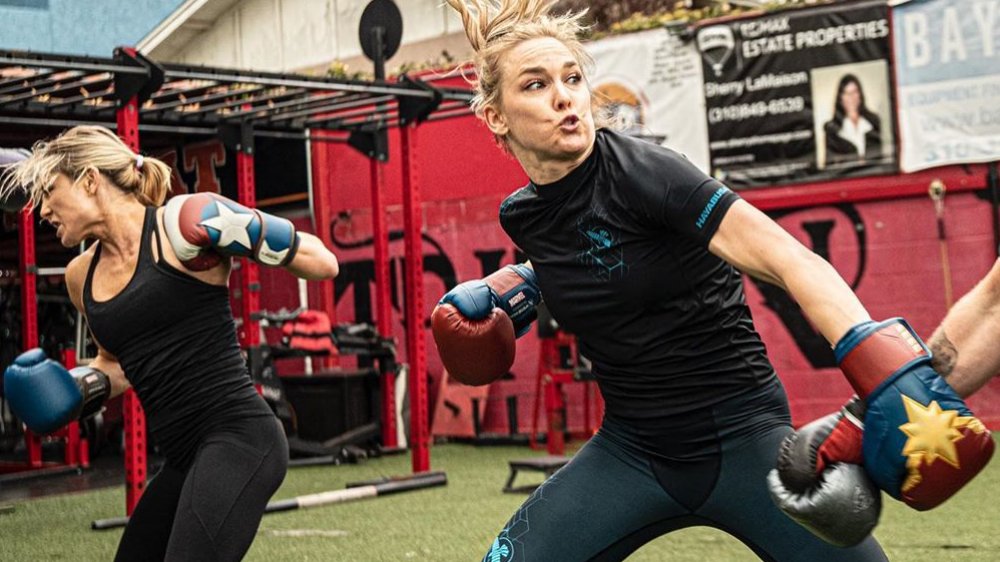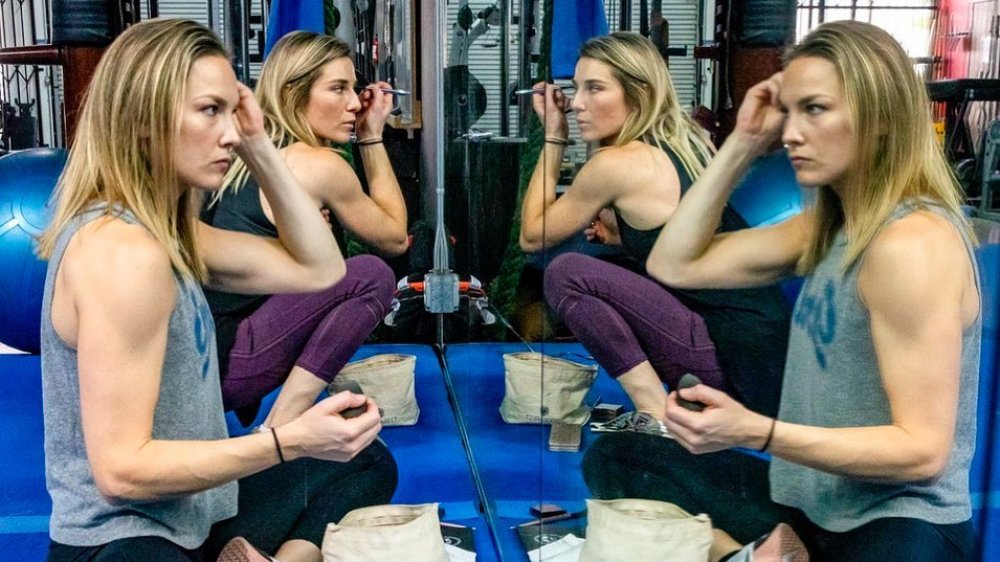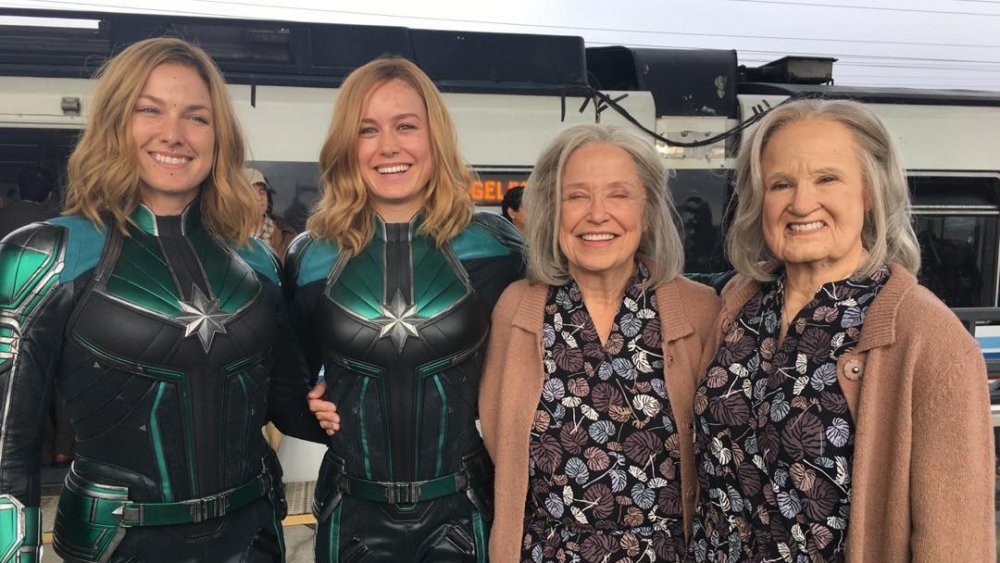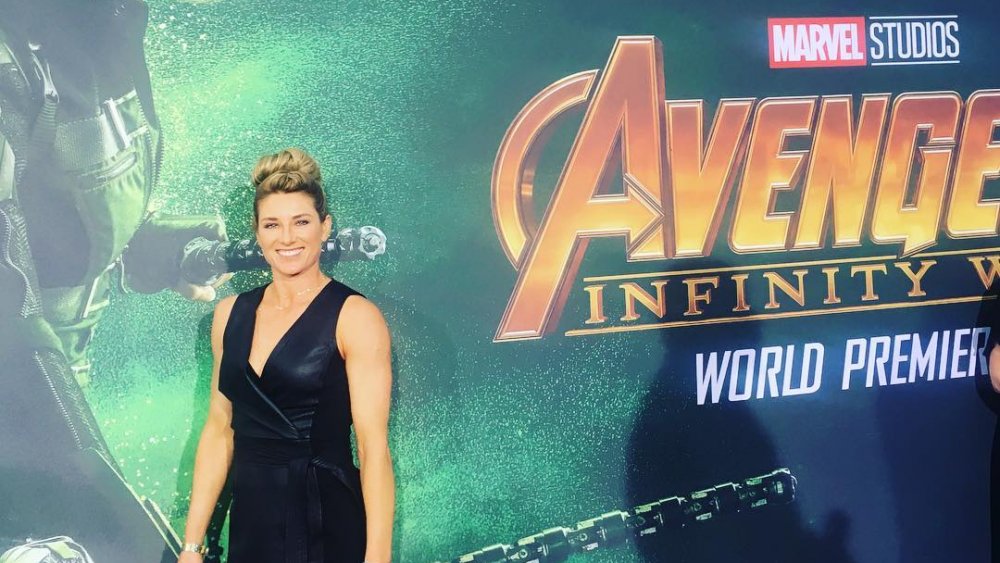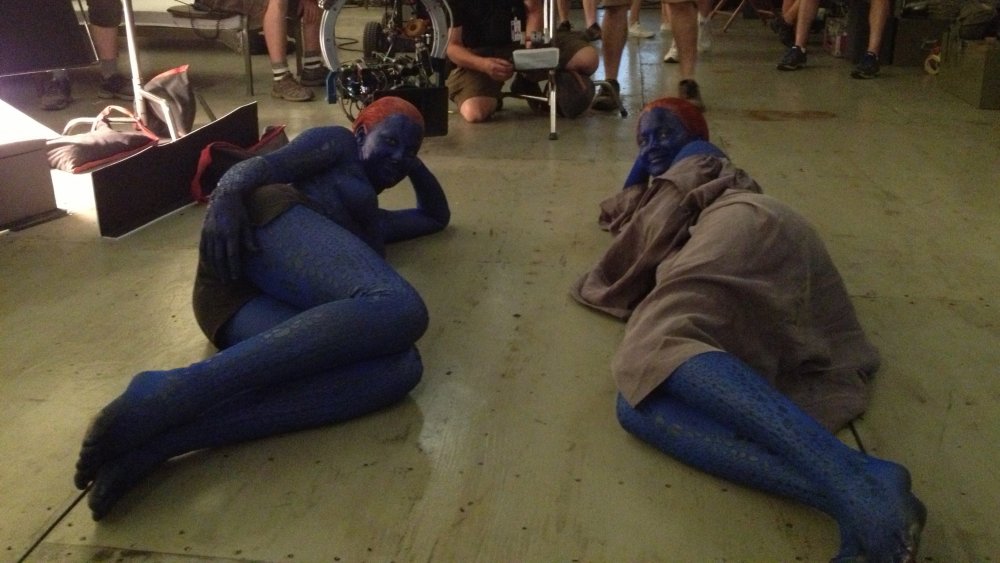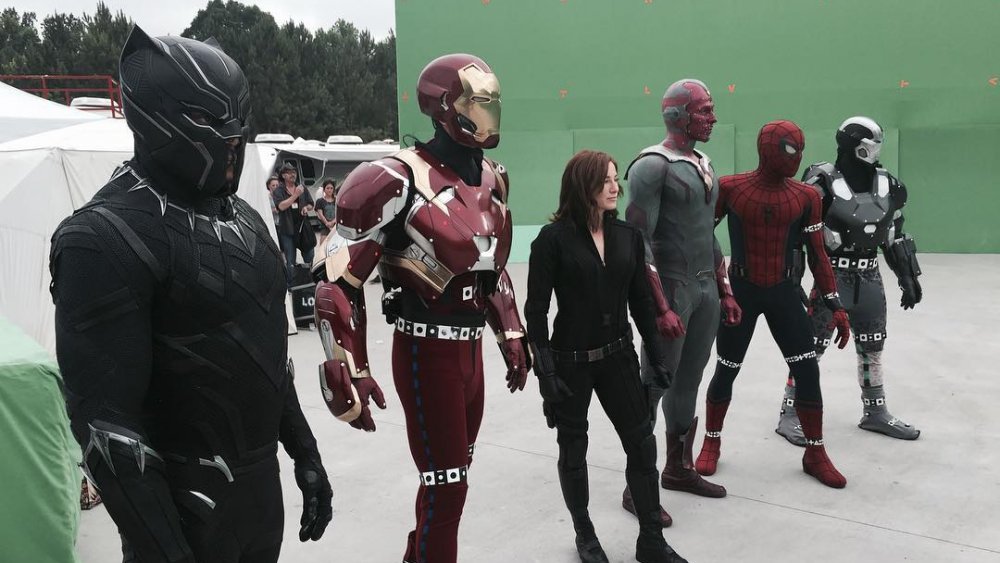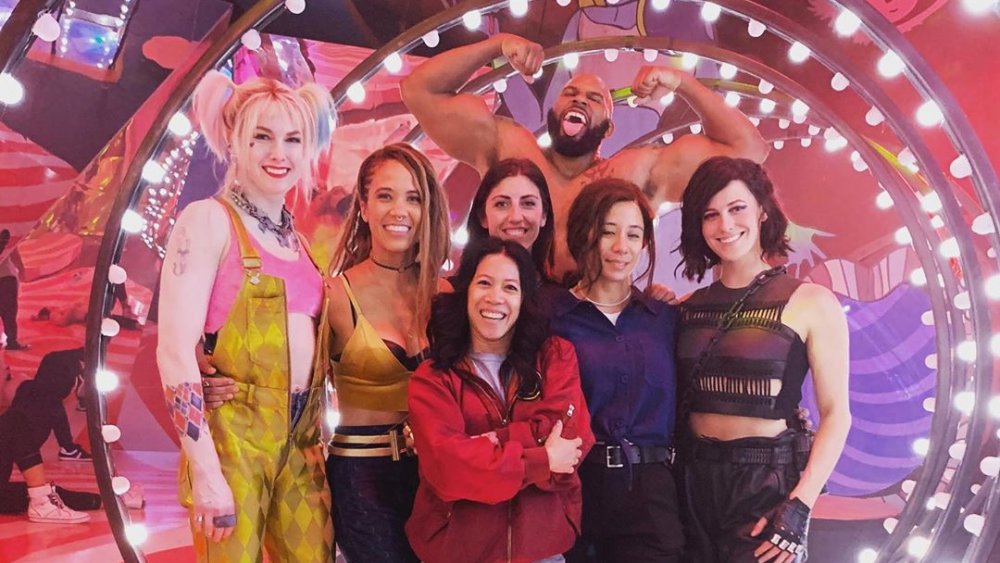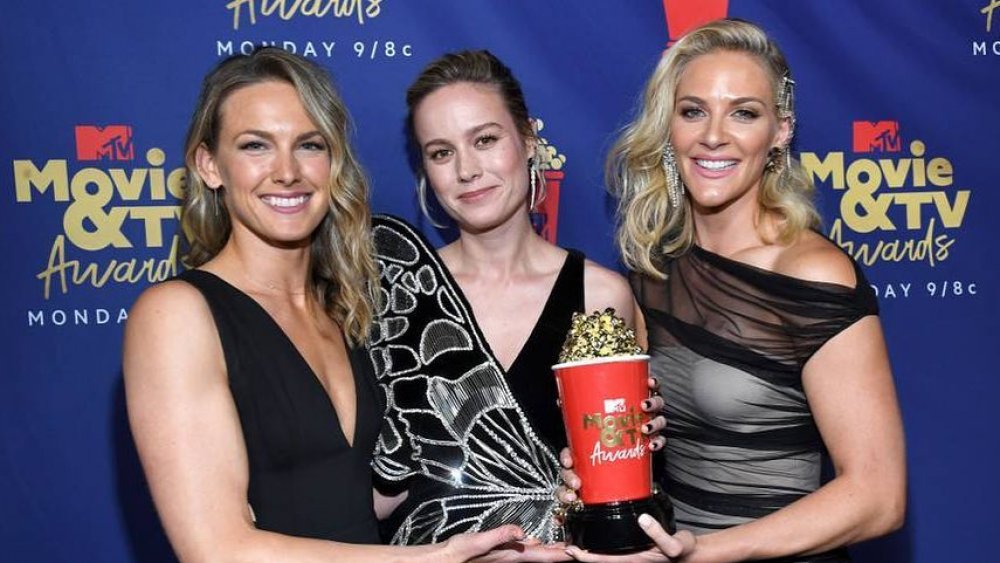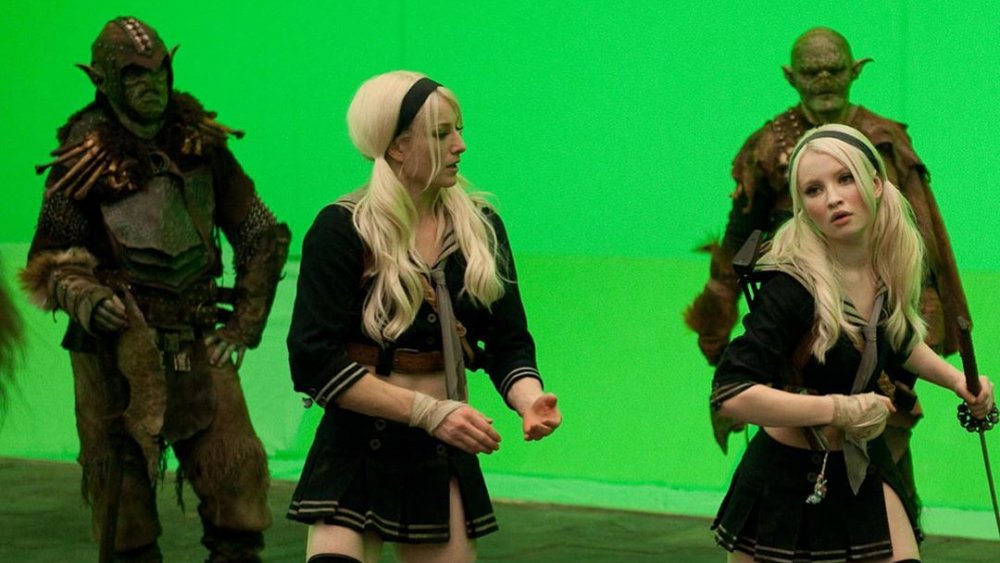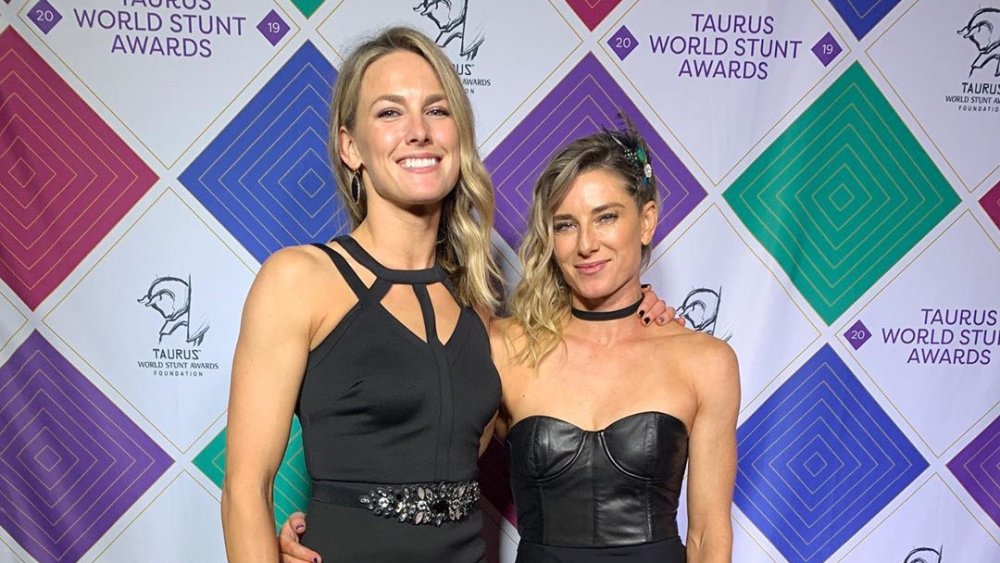Stunt Legends Heidi And Renae Moneymaker Talk MCU, John Wick, And More - Exclusive
The past decade or so at the movies has seen a boom in female-fronted action flicks. Sparked by the runaway success of the Jennifer Lawrence-led Hunger Games films and superhero efforts like Wonder Woman and Captain Marvel, this trend has seen some of Hollywood's biggest female stars getting involved in the type of slam-bang fights, chases and shootouts that used to be the exclusive domain of their male counterparts. Of course, there's only so much the marquee names are able or willing to do, which means that we've also seen an increase in opportunity for female stunt performers who can bring the goods when it comes to kicking ass. In that arena, the sister act that is Heidi and Renae Moneymaker has been rocking it particularly hard — basically, if you've seen a woman in action onscreen in the past few years, chances are one or both of the Moneymakers were involved.
Neither, however, is a newcomer to stunt performance. A former college gymnast, Heidi Moneymaker got into the business in 1999 with work on Joss Whedon's Angel. Since then, she's been crushing it all over film and TV, perhaps most memorably as the primary double for Scarlett Johansson in the actor's portrayal of Black Widow since the character first appeared in 2010's Iron Man 2. Renae joined her sister in the stunts business in 2011, and has gone on to double Jennifer Lawrence across multiple films (including The Hunger Games and the X-Men franchise), as well as serve as one of two doubles for Brie Larson in Captain Marvel.
For an inside look at what it's like to be part of the team bringing these iconic characters to life, we sat down for an extended chat with Heidi and Renae Moneymaker to discuss the Marvel Cinematic Universe, why CGI will never replace practical stunts, and what it's like walking away from an explosion while trying to look cool.
Heidi and Renae Moneymaker on the challenge of staying stunt-ready during a pandemic
The first question I have for you guys is how this whole situation with the COVID-19 pandemic is affecting your ability to stay up on the type of stuff that you need to do the work that you do?
Heidi Moneymaker: Well, we've been doing a lot of at-home workouts. Renae and I have quarantined together separately. We coparent our niece, Rosie, so she comes back and forth as it is. We have two households quarantining together. We've been training up at her place. She's got a bigger space and we've got some gym mats and stuff. We've been training up there together which is nice.
Renae Moneymaker: Also, Heidi has a fitness company that's based around action — Action Star Training Program is, I believe, what it is called. I'm doing a lot of that and that's a lot of what we do. Definitely, I've been doing a lot of that.
You have a full arsenal at home, swords and staves and things like that?
Heidi: Yeah, we've got weapons. They're dull.
You both participated in the Boss B***h Fight Challenge video. How did that come together?
Heidi: Zoe [Bell] called me and sent me the link to one of the other challenges that were similar and she said, "Hey, should we do a female version of this, but then get our actresses involved and they get stunts and actress thing?" I said, "Yeah, okay." I feel like Renae probably had the same reaction, but basically when she said, "Should we do a female stunt version of this," I don't speak for Renae, but I basically was thinking, "Yeah, but I'm going to do a real stunt and not going to do just a head take." That's where the fly over the balcony, fall down the stairs came into play, and Renae did just a giant flying flat back down the hill at her house.
Renae: I'll add on to that because I think it's a really good representation about how Heidi and I don't really halfway do anything, even when it's a non-paying project, it's in our free time and it's all these things. Yeah, we definitely came up with three different versions of what we were going to do and then —
Heidi: I was going to get hit by a car at one point, right?
Renae: Yeah, I know and we decided, "Don't do that one."
Heidi: Because Renae said we could use her car, and then, I was thinking, "Oh, man. What if I break a window or dent it?"
Not like, what if you break your skull —
Renae: No.
Heidi: We can't think like that.
Was there anybody who was participated in that whose work you're really surprised by? Halle Berry having dung flung at her...
Heidi: I called Halle and I asked her if she wanted to be involved and she said yes, and I go, "Well, there's a couple options. You're next up, but basically, Monique is swinging horse poo into the camera. If you don't want to do that, I totally understand. I can do that one and then I'll hit you. You can do whatever," and she goes, "Oh, no. I want poo." She was so game. I love her so much because she'll just say, "Yeah, put me in." She wasn't worried about anything. Yeah, that was —
Renae: Halle takes the cake, the poo flung at her.
Heidi: I don't know. Who else did cool stuff? Everyone was very creative, which was really fun.
I think Jessie Graff had the wire work.
Heidi: Yeah.
Renae: Yeah, then there was another girl.
Heidi: Dayna Grant?
Renae: Yeah, she got a wire as well. It was a little more hidden. Then, I really liked Cameron Diaz. I thought —
Heidi: With the gloves and the groceries.
Renae: Yeah.
Heidi: Sarah Irwin was just funny with the golf cart, too. Everyone is so creative. It's great.
Backing up now, you both had gymnastics backgrounds, which were the gateway for you into the stunt world. What's one other skill that, if somebody was really looking to get into stunts, you're like, "You should absolutely know this before you get into this game"?
Heidi: We probably have a similar answer, but I'll go first and you can back up if you want, Renae, but I would say I'm taking a judo class and knowing how to fall, because, at the end of the day, stunts are about falling down, being safe and looking like a professional doing it. I think taking a judo class and knowing how to fall correctly and not hurt yourself or hurt yourself less is probably one of the most important things. What do you think, Renae?
Renae: Yeah, I agree. Absolutely. Another thing that judo really helps with is partner work, like learning how to dance, give and take with your partner because it's a lot of push, pull, sweep. I think that's a really good aspect to it as well.
Teaching people how to fall is always a very interesting experience because they think it's a very basic thing, but —
Renae: There's an art to it.
Heidi: It's like that thing when people go to fall accidentally, they always put their hands out or put their hands back or they try to save themselves in a way that ends up hurting them more, whereas if you just fall down on your back, on your side... obviously, you have to know how to do it, but it's almost safer than trying to stick an elbow.
Renae: Giving into it. The more you fight it sometimes, or the more you try to stop yourself from falling, the more dangerous it can be.
Heidi: I was thinking of that the other day.
Renae: Snowboarding, right? If you fall, fall into the fall.
The Moneymakers break into the business
Rereading that ESPN article that recently just got republished, one of the things that was mentioned, I think, in Heidi's story in particular was the transition from getting into fighting and stunts versus other kinds of stunts. Can you explain, at least in a professional sense what the difference is and why that can be a difficult transition?
Heidi: That may have been my personal experience. I'm not sure if that's something that everyone goes through, but for me, I think because I had come in as a very high-level gymnast and the first few jobs I had done were very acrobatic, people saw me as a gymnast. I could flip, I could fly, I could fall, I could do all sorts of air rams and kind of stuff, but I didn't have a martial arts background. I guess, I didn't tell anybody that I had been training too much, but no one ever looked at me like a fighter. That for me, I've just decided one day, "Well, I like doing this. I'm going to train this with these amazing guys and I'm going to learn all this stuff and it's an amazing workout and then I'll be a gymnast at work, at school."
My first real screen fight was Iron Man 2, but I was already very seasoned as far as being able to perform. I'd been doing it for so long. I just never really got the opportunity to perform because no one knew that I could.
Renae, did you have a similar experience?
Renae: I had a very different experience. When I got into the business, Heidi had been... how long have you been performing at that point? Six or seven years?
Heidi: Maybe six, six or seven years by the time you got in.
Renae: When I told Heidi "I want to be a stuntwoman," she said, "Great. You've got to move to L.A. I'll help you with training." The first thing she said was, "You've got to learn how to fight. Keep up your gymnastics because that's your foot in the door. That's what's going to be your first... That's what you're going to get hired for, but if you want longevity, you need to learn how to fight and fight onscreen." Right off the bat, I was training with Heidi at 87Eleven. She taught me from the ground up. I would say I started doing fights, I think, a lot earlier. You know what? They were more of a mix. I think more a mix like acrobatics, like gymnastics, acrobatics, and martial arts, mixed, not strictly getting hired just to do fights. It was more flippy, wiry stuff with maybe some fight beats.
Heidi: I think also, at that point, everybody was saying, "Oh, your sister is coming to the business. Is she like you?" I said, "Yeah, she's basically me but taller." I think it was already an idea of, "Okay, obviously, she probably can do everything Heidi can do or more." I think that was a little bit different to coming in. It was, "Oh, cool. Another one."
Renae: Yeah, that was big thing when I was first getting started, is Heidi is telling me, "I've worked really hard to make a name for myself and people are going to expect the same out of you. You've got to be good fast, like really fast. Like yesterday." She was right, though, and I'm really glad she was that up front and real with me because it would have been... It was tough to train and learn fast like that, but I think it would have been a lot tougher to not realize that and then get into business and be a little bit more judged. "She's not as good as her sister." Oh, that would hurt.
Heidi: I think it was better for you that we pushed you really hard in the beginning and held you to a really high standard because then, when you started, I had so many people coming back to me going, "Wow, your sister, for someone so young, she's so talented. She's heads up. She's always paying attention. She's always helping everyone out and everything." She already went in, impressing people, which was cool.
Heidi and Renae Moneymaker on doing double duty
Both of you have done parts where you've kind of been attached to one particular actor over multiple films. Jennifer Lawrence for Renae, Scarlett Johansson for Heidi. How does that that process happen, and what kind of relationship develops over time with an actor who you're working with across multiple films?
Heidi: You know what? It's sort of probably different in every experience. I have been with Scarlett for almost 11 years now. That just started off as a luck of the draw. Tom Harper, really amazing coordinator, brought me in for Iron Man 2 and basically had her select between myself and Bridgett Riley, another very good stuntwoman, and Scarlett happened to pick me. We did that film together. Then, I think the next one was the first Avengers and it was just like the coordinator thought, "Okay, well, who doubled her on the last thing? Cool." I knew the coordinator very well. It started off less about me and Scarlett having that relationship of her bringing me along and more like me just always being there, but Winter Soldier, I think she was like, "You know what? We work really well together. I really think that we should work together on everything that we do." I said, "Yeah, sure. Call me. If I'm available, I'm there for you." Renae has had a connection with a couple of different bigger actresses. She has a little bit different experience, so she might have a different answer there.
Renae: The start with me and Jennifer, I got hired to double her on the first Hunger Games and we got along really well. We were close in age. I was a really good match for her. The same action team was on Catching Fire, so they brought me back along. That again continued a good relationship with Jen. Then, she had X-Men: Days of Future Past coming up after that film and she asked, "Hey, You're a gymnast, right?" I said, "Yeah." She said, "I want you to come do X-Men with me. Do you think you can?" I said, "Yeah, absolutely. Dream come true. Are you kidding me?" Then I think at one point, she said, "Yeah, I think we do everything together now."
At first, it was more the action team bringing me along and then creating the relationship to where Jen was then saying, "Hey, you're coming with me." Even when I tried to get on X-Men, it was a Canadian production. I talked to the coordinator and he asked, "Well, are you dual citizenship?" I replied, "No." He said, "Well, then, I hope Jen will fight for you because I can't get you on unless," yada, yada. Then she wrote a bunch of letters and basically really fought for me to get on that.
Heidi: That's so crazy.
It sounds like you do develop, though, a bit of a close bond with these people who you work with in some capacity.
Heidi: Yeah. I'm sure Renae is like this, too, but my role is you go to work and it's business. Obviously, there's great relationships here and there, but I don't even have a bunch of stuntwomen that I spend a lot of time with. I try to keep my work life my work life. Most people I go work with, we get along really well, but I try to keep it a little more businesslike, but some people, you just end up bonding with, and especially having been with Scarlett for 11 years. We did Infinity War and Endgame and that was over a year of filming straight and we're in different countries and you're going through different life things and stuff, so you do. You end up bonding over those kinds of things. I wouldn't say that I bond like that with every single actress I double.
Renae: Also, coming up my sister as my mentor, she told me that as well, "Keep your relationship professional. Don't blur your lines too much." Yeah, at the beginning, I would say for the first several years, I was very friendly and had a connection, but also tried to stay very professional. I do think that Jen respected that about me because I think it made both of us let our guards down a little bit. Again, me and Jen have done eight films together. After a while, we're like, "Okay."
Heidi: "Fine, let's be friends. Okay, fine. We're friends. Fine, I'll be your friend, Jennifer Lawrence."
Renae: No, not like she's banging down my door to be friends, but you know what I'm saying, right?
Obviously, there's the technical side of executing these stunts, but it would seem there's also a certain amount of mimicry that you have to work with in terms of selling that person's mannerisms in the midst of a stunt or something like that. Is that part of the craft of what you do?
Renae: Yeah, I did. It absolutely plays a role and I think the more that you can become the character or adopt certain mannerisms, the closer of a match you're going to be with the other person, so you can essentially trick the audience into being one person.
Heidi: I remember on Iron Man 2 doing that fight scene that we did with all the guards and everything. At the end of that fight scene, spoiler alert, Scarlett or Black Widow walks down the hall and someone pops out and she just sprays them with... I don't know what we're spraying? Mace? I don't know. I forget. Anyway, when we were shooting the pre-viz for that, I was marching down the hall super-fast and like Linda Hamilton, Terminator 2, and sprayed the guy and walked out. I was watching the pre-viz with Scarlett and she asks, "Hey, do you think I walk like that?" "Oh, no, sorry." It was one of those first times I was like, "Oh, yeah, I've got to make sure, even in the pre-viz, make sure that I'm trying to mimic her as much as possible." I've spent a decade trying to learn how to be sultry like Scarlett Johansson.
Your Scarlett-isms.
Heidi: Yeah.
Renae: I just have one more thing to add on. When you're wearing a superhero costume... when I was the Wasp, on that film, we had sometimes three units going, so you don't always have your actress on set with you and you're in full helmet, costume, everything. You are a replica, basically. In a sense like that, where you are the only person on set that's playing that character, it's very important to be able to... I'm thinking back to when we were doing the car chase and I'm in the back of the van as Wasp and she's shooting out the back, you have to do it exactly how she would. I know that for her, she really wanted Wasp to be very elegant and strong, but also really bring the feminine. I knew how important it was to her and I didn't want her to see dailies and, "What is she doing?"
Who's an actor that you've worked with or has there been an actor you've worked with who surprised you in terms of either their proficiency with stunt stuff, or how game they are for some of the trickier beats?
Heidi: Most of my actors have been fairly game to do stuff, but my number one would be Halle Berry, because I trained her for John Wick 3 and we trained together for six months. She went through more than I can even mention here, but was just, no matter what, was 100% in the role, in the character. We were in Morocco during her fight scenes. Her stunt double rehearsed everything, but there were only two parts of that that Halle didn't do. One was a slide under the table because she could potentially cut her face and we didn't want her to do that, and the other was a dog jumping off her back.
It was just because one of the dogs that was supposed to jump off her back, he wasn't able to make the jump that day and we had to put the very aggressive dog in and it was just a matter of, "Oh, if for some reason that dog got freaked out and bit her, we didn't want that to happen." But she did everything. She's incredible.
How about you, Renae, anybody come to mind?
Renae: Yeah, I have two. Brie Larson and Margot Robbie. I'll start with Brie. I was really impressed with not only how much she trained once prep started, but she trained with a trainer six months before that, on her own, just trying to get strong for the role and getting strong so that once she got to stunt training, she could adapt. That was very beneficial to us because we didn't have to start from ground zero with building strength and endurance. She came in having that. We could always tap on more and more and more. It was just really impressive watching somebody who had never done really much action or really any martial arts or sports or anything like that, just really take on a little bit more. She'd come in everyday and say, "I'm going to nail this kick today."
If she couldn't get it, she was very, very hard on herself. You see that with other star performers or athletes. It was the first time I really saw somebody'd come in every day. She never canceled rehearsal. She always, always showed up when she was supposed to do it and really just gave it everything she had. We did, I think, three months of prep and then three months of shooting, so it was a six-month action film. She held up through that whole movie and long days. We were able to do so much with her more than I had ever seen up to that point with an actress.
Then moving on to Margot Robbie, she is a specimen. She really is. You can demonstrate something, let her practice it three times and then she got it. I caught her one time before she came into practice in the car and she was reviewing like reference videos from the training before. When she came in, she already knew the choreography. It was fresh in her head. It was just very impressive. She was next-level with all that stuff. Also, I was very impressed with the amount of focus she had when we had the time with her.
On Birds of Prey, she was the star of the film. She was a lead producer. She was a busy girl, right? Sometimes, she'd come in and say, "I'm sorry, guys. I got 25 minutes," and she set a timer and she'd be like, "But I'm here, so let's go." For that time, she would be completely focused with us and give everything she had for that 20 minutes and then say, "Okay, got to go. Got a meeting. Bye."
The franchise effect on stunt performance for Heidi and Renae Moneymaker
You both worked on some pretty big franchises, X-Men, Marvel, Hunger Games, John Wick, etc. Is there something that characterizes what it was like working stunts within the MCU versus within a Hunger Games movie versus John Wick? Do they have their own distinct character each time other than, obviously, having different actual actions that you had to do?
Heidi: Every film is different, even if it's within the same franchise because you don't always have different producers, especially in the MCU, but you often have different coordinators and different people involved. Things are always a little bit different. I would say we got into quite a rhythm with the Marvel stuff towards the end of those last few movies, just because it was a lot of the same people. With the John Wick series, it's a different ballgame because you've got your lead actor, Keanu Reeves, who's training harder than anybody else on the whole film and just giving it his all, not 24 hours a day, but every single moment of every training session.
You're trying to make sure that you're staying up to speed with them. We don't have to do as much training because we already have a lot of skills that he's learning, but at the same time, you've got to put in the same effort and you've got to show up, especially when your lead actor is getting thrown around and everything... especially when training Halle. I was spending the first half of my day going in the gym with other professionals, training my ass up and coming up with choreo and drills and different things for her because she came in at 150% every day. I had to make sure that I was there at 150%.
Not only did I have everything set out and ready to go and A+ training for her, but I had backup stuff in case she nailed all that we need to move forward. The John Wick prep and training is really intense. Totally worth it. Really, really intense. I'd say that's the difference there. Not that the Marvel stuff is not hard and we don't do a ton of rehearsals and everything else, but you don't have your lead actors literally doing all their own stunts a little bit different. What about for you, Renae?
Renae: It was so long ago, I'm trying to think back to it. I would say that The Hunger Games, it wasn't any kind of specialized stunt work. We did a bunch of wire work, a lot of falling down the hills, lots of tree climbing. Then again, if you're doing anything John Wick, you were doing specialized training. You're learning the practical side of it as well as the on-the-screen side of things.
I'm guessing maybe X-Men was time in the makeup chair.
Renae: Yeah, Birds of Prey, too.
You had to do the full Mystique look, I'm assuming.
Renae: Yeah, definitely. I think it was three hours in, 45 out, if I remember correctly.
Heidi: Yes, when the crew calls at 6:30 or 7:00, that's an early day.
Renae: My longest day was a 21-hour day and it was on X-Men: Days of Future Past.
Heidi: Oh my god. My longest day was a little over 24 hours, but it was in China on a film where there were literally no rules.
Renae: My god.
Heidi: Sure enough. I did a fight scene at the end of the 24-hour day. I don't recommend that.
Renae: No, I'd say on X-Men, my average day was around 15 to 18 hours. Then if I got out at 12 hours, it felt like an early day.
Heidi: Half day.
Renae: It changed me and I changed the perspective a little bit.
What, to your mind, characterizes the difference between a movie with good stunt coordination, good stunts and a great stunt film? Then, do you have an example for each of you, a movie where you're like, "This movie I worked on nailed how to do stunts ?"
Heidi: You know what? I think you can have a really amazing stunt coordinator and a really amazing team, and if everything is not cohesive from the top down, you can run into problems. For me, one of the smoothest run films was a movie called Sucker Punch. Our stunt coordinator, Damon Caro, had a really good relationship with the director, Zack Snyder. They worked very cohesively. Damon was able to get his six or eight weeks of prep which we needed with the actors, with us. Zack actually came in and would shoot our pre-viz.
It would take us way longer to shoot the pre-viz, but he'd figured out and shoot it exactly the way we're going to shoot on the day. Storyboards, when we went in, were literally like pictures taken from the pre-viz that he shot, put up on a board and we knew exactly what we're going to shoot and exactly how we're going to shoot it because he already shot it. For me, yeah, that was one of the best-run movies just because we had this flowing, cohesive thing and it started from prep and it went right into shooting.
I would say if you can get everybody working together like that, then you're golden, but that doesn't always happen. That's not always the way things work. I've worked with really amazing coordinators and amazing teams. For example, on I want to say Civil War, we were on stage outside, but we had this massive cement tarmac that they built for us. We're out there, we're prepped, ready to go and shooting, and then all of a sudden, a lightning storm comes in. It would happen every couple of days and it was shut us down for most of the day and put us behind schedule and then it's raining and we're cold and wet.
Then, fine, we've had enough time in between lightning strikes that we can go back out and shoot. Now, you're wet and cold and you're trying to fight in cement. Those things can come up and really destroy the flow.
Renae, do you have a particular film you worked on where you felt like, "Man, this is really the stunt experience"?
Renae: Absolutely, the reshoots for Birds of Prey were actually similar, I think, to what Heidi was describing. Chad Stahelski directed the reshoots. Also, you know, he put together the stunt team. It trickled down from him. We always had a very clear idea of what we were going to do and how we were going to do it. There wasn't a lot of guessing. I'd say, when everything's running smoothly and operating, how it should be, it's just this feeling of, "I just need to do my job. Everyone's just doing the job that they're there to do and it's all working together."
It's that feeling where you just have to worry about what you have to do and not be thinking, "Oh, should I check this? Should I check up on that because I'm not sure if this will happen or whatever?"
One of the great things about the fights in Birds of Prey was the long takes and wide shots, because it seems like went through this period in which, with the Bourne films, the really quick cuts became a thing with fights and you lost a lot of what was happening. How do you guys feel about that as performers? Do you like the longer takes? Do you like it more when it's chopped up?
Renae: Well, it's great when they say, "Hey, we're going to just do fight beats and cut it all to pieces," because you're just thinking, "Great. I want to do fight beats and that's it," but the longer takes are because when you get into the flow of something and you can see the big picture of what's happening, sometimes great things happen. The problem with long takes is that, if you're doing one big long take, it's really hard to hide bad performances. There's often bad performances — not always — and sometimes you throw a punch and it's just off.
With John Wick, Chad does very long takes and uses his actor. The only reason he can do that is because he's trained his actor so proficiently that he's very good at what he's doing. You can watch it wide and it does look good, but it doesn't always work. I don't know the reason behind the Bourne stuff, but I know that within what they were doing, you can hide a ton. You can make it look really exciting without having a lot of amazing performances in them.
Heidi: I'll just add in, sometimes, even if your stuff gets all cut up, you're doing longer takes. It's not just, "Okay, we're going to do this punch and we're going do these three beats." Sometimes, you're doing maybe your final beats broken up into three sections and you do it in three longer sections. I'd say like very rarely are you just doing a few beats at a time. We're usually doing a section of the fight.
Renae: Also, you have to choreograph. If you're going to do a long take and you're going to make it look good, you can't just choreograph anything and say, "Great, we're going to do one big long take." You have to choreograph for that take. You have to know the camera's path. You have to know where you're going and what you're doing and you have to know what's going to look good. Not everything looks good wide. Some things look good, close up, some things need movement and all that.
Heid and Renae Moneymaker on their most memorable stunts
We talked a bit earlier about falling, but what would you say is another stunt skill that looks deceptively easy on camera but is not?
Heidi: My answer to that would be with regards to driving. A lot of the bigger sliding around corners, reverse 180, all the tricks. Mind you, you have to be good at those, especially if you're in a tight space and you can't hit anything else, though sometimes, you have more energy and power and a little bit of room to play, whereas when you have to come in a very specific mark with a car and stop. Or, recently, during a Nissan commercial, I had to parallel park really fast all in one movement in a tight spot. On camera, watching it back, it just looks like she goes, "whoop!" It doesn't look like a big deal, but it was the hardest.
I did a reverse 180 in that, too. I did other stuff in there that was what you think might be harder and that was the hardest day for me. It was trying to not hit the other two cars and do one movement of a parallel parking. For me, it's the little things in the car.
Renae: Yeah, I think a lot of the time, it's the little things that you underestimate. I haven't done a lot of driving, but yeah, I would say sometimes just maintaining distance with a camera car, or just those little things like that. Sometimes you're focusing so much on the big gags that you put a lot of time and effort into that and then you underestimate some of the smaller stuff.
Heidi: Sometimes, the smaller things are what you end up getting hurt on because your focus is not... You're not being unfocused, but you're so focused when it's a big deal. When it's a smaller thing, you're thinking, "I did this all day. I'll be fine." That's when you get hurt sometimes. That's why I did a stair fall for the Boss B***h challenge, because I didn't want to get hurt. I think Renae and I both were thinking, "Okay, if we're going to do this, what's at stake?"
What has been the most memorable stunt for each of you?
Heidi: The most memorable for me at this point would be the reshoots for Black Widow. I went into the video village tent and talked to Scarlett and I said, "Hey, are you be doing more of these Black Widow movies?" She goes, "I don't know." I said, "Just wondering, am I about to go out there and do my last stunt as Black Widow?" She goes, "Maybe?" It wasn't even a big stunt. I was jumping 16 or 17 feet off the platform and rolling and crashing, but yeah, it was the most memorable because we both knew, "Oh, this might be the last Black Widow stunt, and it might not." Either way, it was super emotional for both of us. We even had the behind-the-scenes camera and stuff, and video. We're hugging and crying and being girls.
Renae: I'd say my most memorable would be for NCIS: Los Angeles. I ran and jumped out of an exploding warehouse.
Heidi: It was big.
Renae: It was big.
Is it hard to walk away from an explosion looking cool when something is on fire behind you?
Heidi: Honestly, for me, I really don't love pyrotechnics unless I'm dealing with somebody I know really well, because it's a science. It's not a perfect science. Some people are really, really good at it and some people are okay at it. There's a couple of special effects coordinators that I really love. Dan Sudick is one of them. He does a lot of Marvel stuff with us. I know you've worked with him a bunch, Renae. It's just like you feel very, very comfortable when he says, "You can stand here. You cannot stand there." You feel like he's padded that, so you probably could stand a little closer, but you're going to stand where you're at.
I remember one of the first times realizing how great he was. We were on, I want to say, the first Avengers, and I think it was the last day of shooting, and it was second unit. It wasn't even main unit. There were no actors there. Basically, I think there were aliens in the air and they were stomping things down into New York. or something. In order to create the same kind of vibe, we had these I-don't-know-how-many-ton metal things in the air that they were dropping down. It was his job to design this. He could have very easily sent his team, who were also very proficient, to go and handle this. If a six-ton metal thing falls on you, you're dead. We're standing under it, running around it.
I remember him being there and just looking at every single piece of thing that's flying in the air and talking to every stunt person, shaking their hand and saying, "Guys, be here. Don't be here." He was just very, very there and aware. I remember thinking, "All right, that's somebody who not only cares about his job, but cares about the people around him." He's not just setting someone up and saying, "Okay, good luck."
Renae: With Dan, I feel very comfortable to ask him anything. He doesn't have an ego or an attitude about it. He'll sit there and explain it to you, answer any question you have. I remember the first time I was around mortars. There weren't even explosions.
Heidi: Just cork and debris and all that.
Renae: It was on After Earth. That was my first experience with that. I remember we walked through the scene. We were just citizens in this area, a bunch of us. We walked through the scene and where we were going to run. Everyone knew our paths and camera and everything, where the mortars were, and then, I remember when we went and everything started going off. I think at one time I fell down and a shoe came off. I just remember being... because it's loud, and it stuns you a little bit, but I'm glad the first time it happened on a smaller scale because when I did go do that bigger explosion., I remembered that moment of how it just stuns you because the ground shakes and it's loud and you can't hear it. "Okay, things are going to start going off and you have to stay focused and know exactly when you need to leave and go."
Heidi: Explosions are scary. Even though we take precautions and there's a very calculated way that we do things, you still blow things up. It's still an explosion. I remember the first time I was on set with an explosion, I was thinking, "Oh, so we just blew that up." It's for real. We really do get hit by cars. Granted, they're not going 40 miles an hour, but we really do these things. Unless you're on set to see it, it feels like it's fake in a movie when you watch it, but when you're there and you see it happening, you're thinking, "Oh, damn."
Will CGI ever replace practical stunts? Heidi and Renae Moneymaker don't think so
I want to get into the whole CGI thing and how that's affected what you do. It feels like we went through a period in the early 2000s with The Matrix Reloaded kicking things off on this idea that we're going to move towards having totally CGI stunts. Now, it feels like we've swung a little bit away from that. What's your experience been like with how that's affected what you do?
Heidi: I feel like, even on movies where they're using a lot of CGI, there's still been enough action and practicality leading in and out of it that you still have a job and you're still working. You're still doing a lot of stuff. With the MMA-style fighting, and the John Wick series, and Atomic Blonde, and people really wanting to see not only actors' faces, but legit moves, not a young skinny girl that doesn't look like she has muscle on he, doing big right hooks and knocking a big dude out, we're starting to see stronger women doing things that actually would take down a big guy.
We're getting more practicality in what we want to see, and it's become a trend. I think that's changed the CG world a little bit. We still use it. We got to use it for a lot of the Marvel movies in general, that you're in space and we're not actually going to go to space yet to shoot.
Tom Cruise is actually trying to shoot a movie in space.
Heidi: I think he's amazing. He's an incredible person and performer.
I just watched Mission: Impossible – Fallout again and read up on that he was doing the whole helicopter thing himself, and everything, and it was crazy.
Heidi: I know. He's incredible. He's a better stuntman than I am. I don't want to be nailed to the side of a plane as it takes off.
He's also possibly physically immortal at this point.
Heidi: Except for that one ankle.
Renae, do you have a similar experience in terms of your relationship to CGI?
Renae: I would say on Captain Marvel, we did a lot of CGI takeover, but for the beginning and the end of when she's blasting off, you're still doing that practically. Those Marvel movies are so much action that we're definitely not getting a lot of sit-down time.
You don't feel like we're getting to a place where in-person stunts, stunts done by real people are going to be jeopardized by this technology in the near future?
Heidi: I don't think so. I think that the people who are good at it have gotten so good at creating worlds, and even some people, but I don't think that it's going to take over the market or the world. I think people want to see people. I think they want it to be real when it's supposed to be real.
Renae: Yeah, and I think even when you can trick an audience, when it's too much CGI, it looks like a cartoon and you can tell. I think it brings you out of it a little bit.
Heidi: We, Renae and I, had a fight scene on Captain Marvel. She was doubling Brie Larson and asked to fight me, which is amazing, on the train, and the script read that it was an older lady. They played around with the idea of basically making me the older lady to play the character with prosthetics. They were working with the VFX team and everything to see if it was possible for me to actually be the character. In the end, they said, "You know what? We have to do so much work and it probably still wouldn't look right. We should just cast somebody, have her come in for just the closeups, and put a prosthetic face on Heidi." We're not quite there yet.
The long road to recognition for stunt performers like Heidi and Renae Moneymaker
Renae, you had a moment last year at the MTV Movie Awards with Brie Larson bringing you and Joanna Bennett up on stage, which was really great because it's this moment of recognition that stunt performers don't necessarily get that often. What do you think it's going to take for larger institutions like the Academy to start putting you guys a little more out there for the work that you do?
Renae: Well, I'm so glad you brought this up. Not only was that a huge moment for me and Joanna (Bennett, Larson's other stunt double on the film) being up there, but that was huge for our community. That was, I think, a really, really great thing that Brie did. Since then, I think there have been a few other actors doing the same thing, like Brad Pitt at his acceptance speech, which was huge at the Academy Awards. That was really cool. I believe it's just a matter of time before we're recognized. I hope that we'll get recognized and I think the more people we get involved, the more awareness there'll be. There are a lot of organizations out there right now, petitions, and all these events —
Heidi: Documentaries.
Renae: Documentaries. I think we've been a part of the production that's been very kept quiet, in a way?
Heidi: Yeah. Because for a long time, in the past, your actor would come in and do all their action, do a lot of their fight scenes and stuff, and then you'd have your stunt double just come in, fall off a thing, drive a car, do a couple bits. It wasn't the same as it is now. Now, you have to be a performer to be a stunt performer and a stuntman or -woman. You're a stunt performer, because you come in and you do a lot of the fighting, a lot of stunts. A lot of times, like Renae was saying, you're on second unit, you don't even have the actor there.
On top of that, a lot of us are actors as well, and we play our own character sometimes as it is. I think that that's on top of the fact that, in the past, if you look at the Academy Awards, when has there ever been an action film up for anything in there? We had one of the Marvel films up for Best Score one year. Then, we had, I think it was John Wick, one of the John Wicks won for Best Original Musical Score.
I think part of the problem is just the Academy Awards have not really been about action films. They've really been about the dramatic films. I think it's important for them to maybe open up that category a little bit. I'm hoping that there'll be some recognition. Now, I think where I was going with that is, in the past, a lot of actors didn't want any people to know if they had stunt doubles. They would keep them aside, because they want the world to think that they did everything. Now, with social media and behind-the-scenes footage, everybody knows.
Renae: The cat is out of the bag.
Heidi: Jason Strickland and Rootbeer Films did a documentary called 2nd Unit: Invisible Action Stars. It's interesting to hear actors and stunt people talk about what they go through and what it's like being a stunt performer and what we do, what we contribute to all these films.
Renae: That's a good one. He did a follow-up piece on some stuntwomen that we're both a part of.
Blazing new trails for women in stunt performance with Heidi and Renae Moneymaker
Which actually leads perfectly into the next question, because I wanted to get into how things have changed and how things are still the same for you as women in this particular profession. I know it was part of the industry that was dominated by men for a long time, and I'm just curious as to how things are shifting, what your experience has been like in that regard.
Heidi: I want to start off by saying that I don't ever think it's right for anybody to put anybody down or to harass anyone in any way sexually or just in general, first of all. But I will say that our industry, it is male-dominated. It's like getting into something like professional motocross. As a woman, if you go in there and you can't hit the banks right and do the jumps, then you can't ride professional motocross. You have to actually be a specific person that has specific talents in order to hang with the guys, if you will. It's a sport that you need to be very physical and strong for.
I feel like that's how our business is, too. Most women can't even do a pull-up. To be capable of some of the stuff that you have to do to be a superhero in these movies, you have to train really hard, you have to be really strong, and you have to be able to take hard hits. In the past, men have been more interested in fighting and training for a fight. Now a lot more women are involved.
For me, in the business, it was always saying, "I want to train to be as good as all these people in the business," not "I want to fit in as a woman." I just want to be really good and I want to be respected. I think that's how I've always felt about it. For me, I don't feel like a lot has changed, because I went in with that mindset, and I've always had that. I feel like I earned respect early on, but I do think that it's wonderful that we're recognizing women more and that we're opening up more opportunities.
I just hope that when those opportunities are opened up that the right people are getting the job and they're earning that position, you know what I mean?
Renae: I'll just piggyback off of that. Now that there have been a lot more leading action roles for women, that's opening the door for us as stunt performers to be lead stunt doubles for these characters. You're not just doubling the love interest. You get to do the superhero stuff or you get to do the big stuff. Then, I'll even say that I've noticed that people are really trying to gender diversify. Even if it's not for your lead characters, even if you're just bringing in people to be stunt pedestrians, they try to get an equal amount. I hear those conversations happen: "Well, let's bring some girls in. Let's bring some other girls in." I have noticed that. They're really trying.
Heidi: I think there are really talented and amazing women out there, too, that can handle some of those nondescript stunt parts, and who just weren't thought of before. Yeah, that is true. That has changed a lot.
How about on the coordinator side? Because it was big news when Zoe Bell was the coordinator for Once Upon a Time in Hollywood. You've both done some coordination work. Is that where you see yourself going in the future? Do you want to be someone who's in charge of a department on these big movies?
Heidi: Yeah, you know what? It is really nice those positions have opened up. I feel like Renae and I have spent a lot of time as doubles, being very involved with the coordinators and basically assistant coordinating and helping coordinate for a long time. I feel like we have some good experience in that world. For me, when my first opportunity came up, there were definitely some things that I needed to learn and get used to, but it was a nice transition. I personally want to direct. I want to move up those ranks and get into a position where I'm directing action. For me, that's definitely where I want to go.
Renae: Same. I think that when the time comes, I think that will be a good progression for me as well. Again, I think I've had a lot of experience with top-tier actors and directors and producers. I have a good scope of how a movie set is run and who's the appropriate person to talk to in a certain scenario, and the right way to talk to somebody on a set. I think I have a lot to give in that respect, and I would love to be Heidi's stunt coordinator when she's directing.
Heidi: That is the plan.
Renae: That's my ultimate. That's the dream right there.
Heidi and Renae Moneymaker are happy to be team players
You mentioned you don't think of this in gender terms, but do you think that there would be something different that a female stunt coordinator or fight coordinator could bring in terms of directing female stunt performers?
Heidi: Absolutely. There have been quite a few actresses I've worked with that I've spoken to who have just said, "I'm so glad that you're here, because you understand." Women are a little different than men. We work a little differently. My first real credit as a stunt coordinator was on a movie called The Hunt with Betty Gilpin and Hilary Swank. Hank Amos was the coordinator. They wanted a female fight coordinator. He said, "I know who I want to bring, but I want her to co-coordinate with me," because he wanted me to be able to have the opportunity to stunt coordinate, which I so appreciate.
We co-stunt coordinated, and I fight coordinated the film. I will say that the teamwork between a very strong male and a very strong female on a film like that, it was really incredible, because there are things that he brought to the table that were amazing and strong and I wouldn't have thought to do, and there are things that I brought to the table that really made the film cohesive. Honestly, I think as a team, I think it's really nice to have your female and male. I don't think an all-male and all-female team in any way would be a good idea. I think mixing together is the way to go.
Renae: Yeah, I'd second that. Again, it's like yin and yang. Especially you and Hank together, I just know that you guys brought so many great attributes from each side. I second that.
Obviously, as stunt performers, you work incredibly hard on these films, you're central to how these big action movies turn out, but the theory is that if it's done right, nobody knows it's you on the screen at that particular moment because you're trying to sell that it's Scarlett Johansson or Jennifer Lawrence, or whomever. What does that dynamic feel like? Obviously, you love what you do, but is that weird?
Heidi: I've been in the business now 17, 18 years, and things were a little bit different when I got involved than they are now. There was more hiding stunt doubles, the idea was work hard, keep your mouth shut in the background, make sure your actor looks good, that kind of thing. For me, I've never thought, "Nobody knows that was me," because I know it's me. I'm proud of it. Honestly, especially with social media and everything now, I feel bad because I get people on my Instagram all the time saying, "You're the real Black Widow," and I'm always saying, "No, no, Scarlett is Black Widow, but together, we're Team Widow."
I feel like there are a lot of people that recognize what we do and are impressed by it, but I've always been a team person. We come from a really big family, so maybe that's why, but for me, I don't really love the individual. I like the fact there's a team. The last Black Widow, I was injured in the beginning and I couldn't do the principal photography in the film. Mickey Facchinello, CC Ice, and Michaela McAllister all went out in its different points for playing Black Widow roles. They did a ton of work. I was so grateful that I got to come in at the end and work on the end of the film.
For me, I feel like it's better for me that there's all these amazingly strong talented women that got to be a part of this Black Widow character, including Scarlett. For me, it's Team Widow. It feels good to be a part of that.
Renae: It's hard to follow that. I think of it more like you're playing part of a character, and I feel the same way, too, when people say, "Oh, you're Captain Marvel." My response is, "No, I'm not, but I worked on it. I'm part of the action of Captain Marvel. Sure."
Heidi: It's interesting, because I think, also, we both did gymnastics in college, and we're part of teams in college. There's something about the camaraderie of being part of that team and how you do together and how you stand together. I don't know. I think if we want the individual limelight, we'll go after it ourselves. Renae and I are really motivated, hard-working people. I think if that ever becomes important, we'll find a way to be our own characters.
Well, those are all the questions, unless you can tell us everything that happens in the Black Widow film that's coming out.
Heidi: Yeah, [imitates audio breaking up]. No, I can't tell you anything, but I can tell you that it's awesome.
